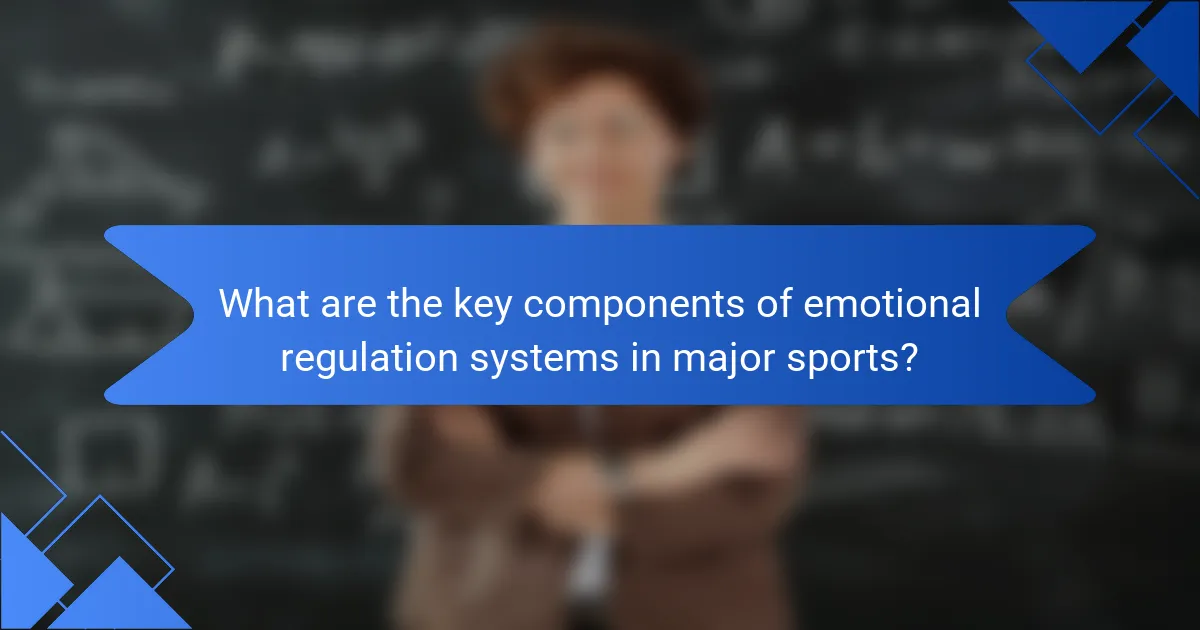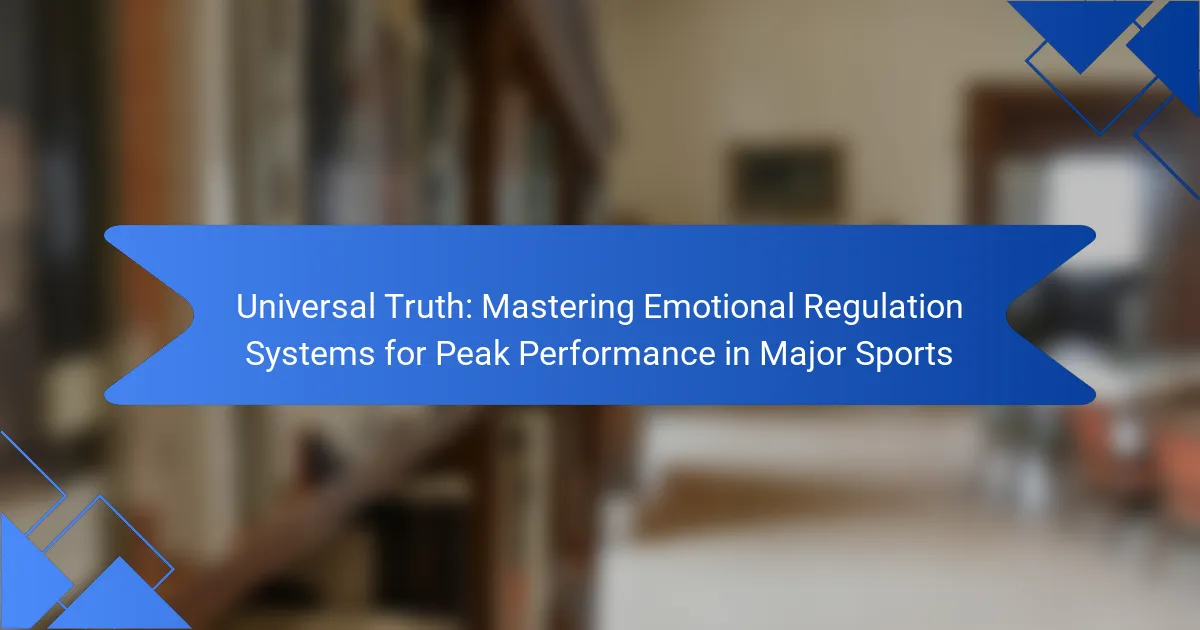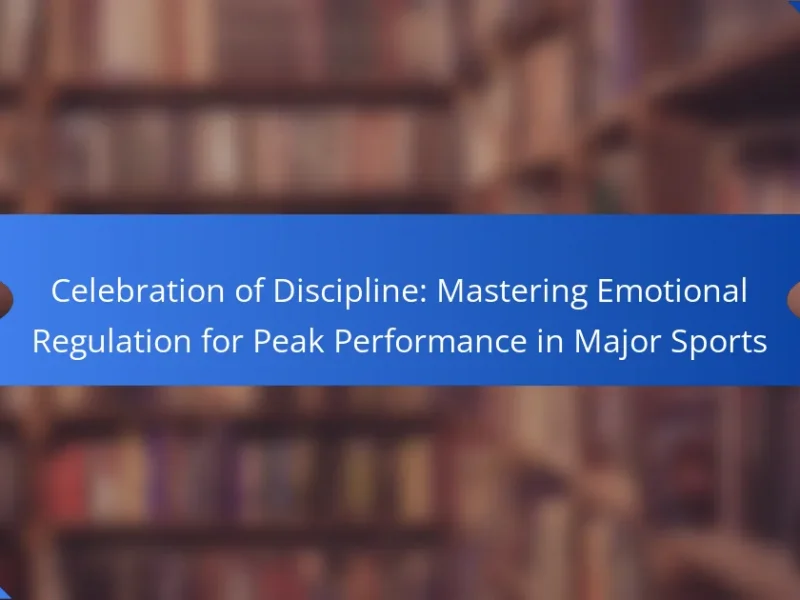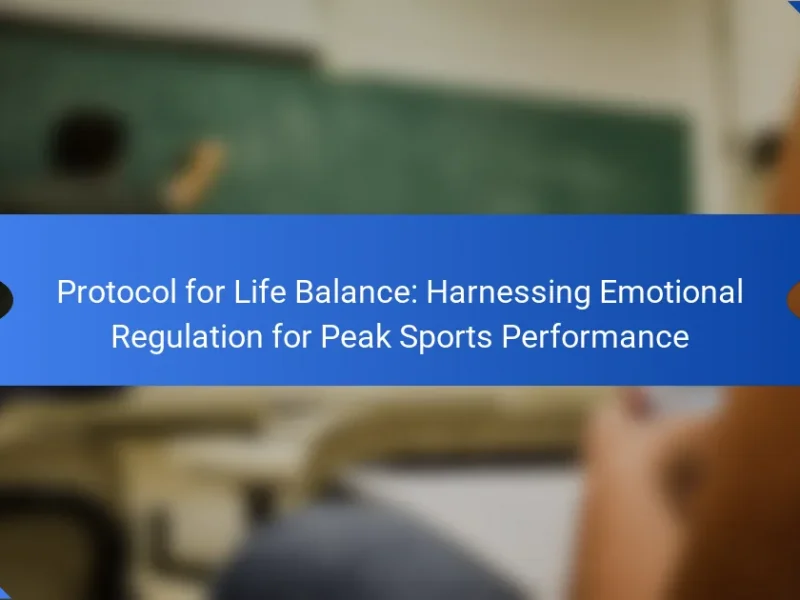Mastering emotional regulation systems is crucial for athletes aiming to achieve peak performance in major sports. Key components include self-awareness, emotional intelligence, and coping strategies. Unique attributes like adaptability and resilience play a significant role in managing stress and maintaining focus. Implementing mindfulness techniques and personalised emotional regulation plans can enhance overall performance outcomes.

What are the key components of emotional regulation systems in major sports?
The key components of emotional regulation systems in major sports include self-awareness, emotional intelligence, coping strategies, and mindfulness. These elements work together to enhance athletes’ performance under pressure.
Self-awareness allows athletes to recognise their emotional states, which is crucial for effective regulation. Emotional intelligence helps in understanding and managing emotions, both personally and in interactions with teammates. Coping strategies provide techniques for dealing with stress and anxiety, while mindfulness fosters present-moment awareness, improving focus and decision-making.
Together, these components form a robust framework for athletes to maintain peak performance, especially in high-stakes situations.
How do emotional regulation systems impact athlete performance?
Emotional regulation systems significantly enhance athlete performance by fostering focus, resilience, and stress management. These systems enable athletes to maintain composure under pressure, leading to improved decision-making and execution during competitions. Research shows that athletes with advanced emotional regulation skills often achieve higher performance levels, as they can effectively manage anxiety and channel their emotions positively. Mastering these systems is essential for peak performance in major sports, as emotional stability directly correlates with success.
What role does self-awareness play in emotional regulation?
Self-awareness is crucial for emotional regulation as it enables athletes to recognise their emotions and triggers. This recognition allows for proactive management of emotional responses, leading to improved performance. Enhanced self-awareness contributes to better decision-making and stress management, essential for peak performance in major sports. Athletes with high self-awareness can adjust their strategies in real-time, maintaining focus and composure under pressure. As a result, they can leverage emotional insights to enhance their competitive edge.
What techniques enhance self-awareness in athletes?
Self-awareness in athletes can be enhanced through mindfulness practices, reflective journaling, and feedback mechanisms. Mindfulness techniques, such as meditation, improve focus and emotional regulation. Reflective journaling allows athletes to analyse their thoughts and feelings, fostering deeper self-understanding. Additionally, seeking feedback from coaches and peers provides external perspectives that can illuminate blind spots in self-perception.
How do emotional regulation systems vary across different sports?
Emotional regulation systems differ significantly across various sports due to unique demands and environments. For instance, team sports like basketball require rapid emotional adjustments during high-pressure moments, while individual sports like tennis may focus on self-regulation over longer periods.
Athletes in combat sports often develop unique coping mechanisms to manage aggression and fear, contrasting with those in endurance sports, who may emphasise emotional endurance and resilience. Research shows that effective emotional regulation can enhance performance, with studies indicating that athletes who master these systems often achieve higher success rates in their respective sports.
Moreover, factors such as the sport’s competitive nature and the athlete’s personal experiences shape their emotional regulation strategies. Understanding these variations can lead to tailored training programmes that enhance emotional skills specific to each sport.

What are the universal attributes of emotional regulation systems?
Emotional regulation systems share universal attributes essential for peak performance in major sports. These include awareness of emotions, cognitive appraisal, response modulation, and behavioural strategies.
Awareness of emotions enables athletes to recognise their feelings, which is crucial for timely interventions. Cognitive appraisal involves evaluating situations to determine emotional responses, fostering adaptive reactions. Response modulation refers to techniques used to influence emotional experiences, enhancing focus during competition. Behavioural strategies encompass actions taken to manage emotions, such as relaxation techniques or positive self-talk.
Together, these attributes form a comprehensive framework for athletes aiming to master emotional regulation, ultimately improving performance outcomes.
What strategies are commonly used for emotional regulation?
Athletes commonly use cognitive reappraisal, mindfulness, and self-compassion for emotional regulation. These strategies enhance focus, reduce anxiety, and improve performance. Cognitive reappraisal involves reframing negative thoughts, while mindfulness promotes present-moment awareness. Self-compassion fosters a supportive inner dialogue, which can mitigate stress.
How does emotional regulation contribute to team dynamics?
Emotional regulation enhances team dynamics by fostering communication, collaboration, and resilience. It allows athletes to manage stress and maintain focus, leading to improved performance. Teams with strong emotional regulation exhibit higher cohesion and adaptability, crucial for success in major sports. This unique attribute creates a supportive environment, enabling individuals to thrive collectively. As a result, emotional regulation becomes essential for peak performance.

What unique attributes distinguish emotional regulation systems in elite sports?
Emotional regulation systems in elite sports are distinguished by their unique attributes, such as adaptability, resilience, and cognitive control. These attributes enable athletes to manage stress and maintain focus under pressure. For example, adaptability allows athletes to adjust their emotional responses based on situational demands, enhancing their performance. Resilience fosters the ability to recover from setbacks, while cognitive control aids in regulating thoughts and emotions effectively. Together, these unique attributes contribute to peak performance in high-stakes environments.
What specific emotional regulation techniques are used by top athletes?
Top athletes use techniques like mindfulness, visualization, self-talk, and breathing exercises for emotional regulation. These methods enhance focus, reduce anxiety, and improve performance under pressure. Mindfulness practices help athletes stay present, while visualization aids in mental rehearsal of success. Effective self-talk fosters confidence, and controlled breathing techniques manage stress responses. Each technique contributes uniquely to maintaining emotional balance, crucial for peak performance in sports.
How do cultural factors influence emotional regulation in sports?
Cultural factors significantly shape emotional regulation in sports by influencing athletes’ coping strategies and responses to pressure. For instance, collectivist cultures often emphasise group harmony, leading athletes to regulate emotions for team cohesion. In contrast, individualistic cultures may promote personal expression, affecting emotional management during competition. Research indicates that athletes from different cultural backgrounds exhibit unique emotional responses, impacting performance outcomes. Understanding these cultural nuances is essential for coaches to tailor strategies that enhance emotional regulation, ultimately fostering peak performance in major sports.

What rare attributes are associated with emotional regulation systems?
Rare attributes associated with emotional regulation systems include adaptability, resilience under pressure, and the ability to modulate emotional responses in real-time. These attributes enhance an athlete’s performance by allowing them to maintain focus, recover quickly from setbacks, and manage stress effectively. Research indicates that athletes with higher emotional regulation capabilities often outperform their peers in high-stakes situations.
What uncommon emotional regulation practices have emerged in recent years?
Recent years have seen the emergence of unique emotional regulation practices in sports, such as mindfulness training, biofeedback mechanisms, and neurofeedback techniques. Mindfulness training enhances athletes’ focus and emotional resilience, while biofeedback allows real-time monitoring of physiological responses to stress. Neurofeedback, a more advanced method, trains athletes to alter brain activity for improved emotional control. These practices not only optimise performance but also promote mental well-being, making them valuable tools for peak performance in major sports.
How do psychological factors uniquely affect emotional regulation in individual sports?
Psychological factors significantly influence emotional regulation in individual sports by shaping athletes’ responses to stress and competition. Athletes with strong mental resilience can better manage anxiety and maintain focus, leading to improved performance. Unique attributes such as self-talk and visualization techniques enhance emotional regulation, allowing athletes to stay calm under pressure. For example, elite athletes often use these strategies to transform negative emotions into positive energy, optimising their competitive edge. As a result, mastering these psychological factors is essential for achieving peak performance in individual sports.

What are the best practices for mastering emotional regulation systems?
To master emotional regulation systems for peak performance in major sports, athletes should adopt specific practices. These include mindfulness techniques to enhance self-awareness, cognitive restructuring to challenge negative thoughts, and consistent emotional check-ins to monitor feelings. Engaging in regular physical exercise also contributes to emotional stability, while establishing a strong support network provides essential encouragement. Lastly, developing a personalised emotional regulation plan tailored to individual needs can significantly improve performance outcomes.
What common mistakes do athletes make in emotional regulation?
Athletes commonly struggle with emotional regulation by failing to recognise their emotions, leading to poor performance. They often ignore stress signals, resulting in burnout. Additionally, many athletes do not utilise effective coping strategies, which can exacerbate anxiety. Over-reliance on external validation can also hinder their emotional resilience. Finally, neglecting mental training can prevent them from mastering emotional control during high-pressure situations.
How can coaches effectively support athletes in emotional regulation?
Coaches can effectively support athletes in emotional regulation by implementing structured emotional training programmes. These programmes enhance athletes’ self-awareness and coping strategies.
Coaches should prioritise creating a supportive environment that encourages open communication. Regular check-ins can help athletes express their feelings and concerns.
Incorporating mindfulness techniques, such as breathing exercises or visualization, can improve athletes’ focus and emotional control during high-pressure situations.
Additionally, educating athletes about the physiological effects of emotions can empower them to recognise and manage their emotional responses. This knowledge fosters resilience and peak performance.
What actionable tips can athletes implement for better emotional regulation?
Athletes can enhance emotional regulation through mindfulness techniques, structured routines, and cognitive reframing. Mindfulness practices, such as meditation, improve focus and reduce anxiety. Establishing consistent training and pre-competition routines fosters a sense of control, minimising stress. Cognitive reframing helps athletes reinterpret negative thoughts, promoting resilience. Engaging in regular self-reflection allows for better understanding of emotional triggers, leading to improved management strategies.


